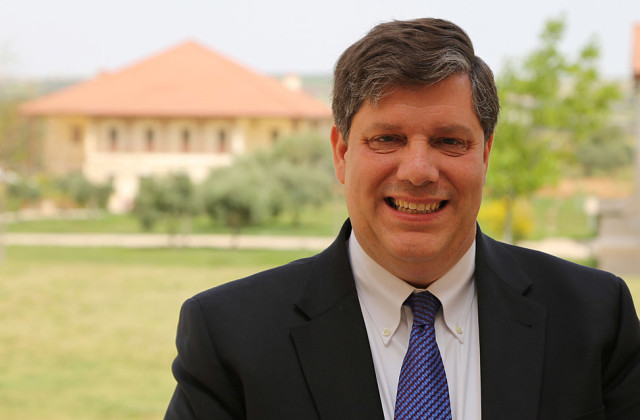A Stint in the Middle East
MacGregor Robinson takes a position at King’s Academy
By Christina Vanderlip
When he headed admissions for Trinity-Pawling School in Pawling N.Y., Norfolk native MacGregor (Greg) Robinson traveled the globe recruiting and interviewing potential students and meeting their families. Clearly, he had not seen enough of the world in his estimation, as he recently accepted a job as Dean of Admissions for King’s Academy—and not the one in New York City.
This King’s Academy is in Madaba, Jordan, some 25 miles south of Amman, the capital, and approximately 40 miles east of Jerusalem.
Robinson’s path to the school is a logical one, having spent most of his life in the boarding school world. He grew up spending a lot of time at Salisbury School, where his best friend lived. Prior to his stint at Trinity-Pawling, Robinson worked at Berkshire School and The Gunnery. He took one short detour from the boarding school world in 1994, when an educational consultant he knew asked him to tutor Prince Hashim, the son of King Hussein and Queen Noor of Jordan. Robinson jumped at the opportunity and set out for Amman without a second thought.
When offering advice to his students, Robinson has long encouraged them to get out of their comfort zones, and tells them that travel is one of the best ways to accomplish that. He doesn’t just talk the talk. As he puts it, “Living abroad for an extended period, you will come away from your experience more confident of your place in the world, curious about what lies over the horizon and eager to explore all life has to offer.”
What lay over Robinson’s former horizon is a small, stable, progressive nation set in a tough neighborhood. About the size of the state of Maine, Jordan is home to some eight million people. King’s Academy is in the plains of Moab—the breadbasket of the country. Amidst the agriculture, shepherds are numerous and the fields are dotted with tents, sheep, goats, dogs and donkeys.
The area around Moab is, quite literally, the cradle of history. Here one encounters evidence of one civilization after another: pre-Christian, Roman, early Christian, Byzantine, Umayyad, Abbasid, Ottoman and Jordanian. The winter palace of Herod Antipas, the monastery at Mt. Nebo, the Dead Sea, the River Jordan—all these are within an hour’s drive of the King’s Academy campus. One can stroll through downtown Amman and an hour later be sitting amidst the remains of an early bronze-age site replete with standing stones and ancient burial mounds.
King’s Academy was founded in 2007 by His Majesty King Abdullah II. It is an American-style boarding school modeled on Deerfield Academy, the king’s alma mater. The campus has state-of-the-art academic buildings, a large athletic center with modern amenities, a 700-seat air-conditioned theater with facilities for music, drama and public speaking, and a library offering 50,000 volumes.
Welcoming students from all backgrounds, religions and social classes, the academy aims to foster empathy, tolerance and harmony. The 600 students in grades seven through 12 come to King’s Academy from 34 countries on five continents, including 40 Americans. There are approximately 150 faculty members. All the world’s main religious traditions are represented. The school is co-ed and, despite the large Muslim population, girls participate fully in all phases of life on campus. Head scarfs are only worn by about 25 percent of the Muslim girls in attendance. English is the primary language spoken on campus.
One of the things Robinson most admires about the school is that, unlike in the United States where sports are overly emphasized, service to the community is the most important student undertaking (aside from academics). King’s Academy students give their time to those less fortunate in many ways, including building shelters for the homeless, reading to the homebound, teaching refugee children how to read and tutoring Jordanian students in English.
Robinson says there were a few challenges when he first arrived—mundane tasks like getting his computer to print, stocking the fridge and making a phone call turned into major productions. What he quickly learned, however, is that no detail is insignificant. In order to make things work, he had to master a new way of thinking, a new way of doing and indeed a new way of life.
If he has one thing to say to those curious as to why an American would choose to live and work in the Middle East, it is this, “There are two truths about the world as I’ve experienced it. The first is that we are all more similar than different. Parents and kids in the Middle East want the same things that parents and kids in Norfolk want—good schools, a chance at a fulfilling career and good relationships with family and friends. The second truth is that differences matter. Americans can’t imagine how closely knit Arab families are. The ‘We’ is infinitely more important than the ‘I.’ This has a profound effect on their culture.”
Robinson is currently on the west coast of the United States, mixing work travel with pleasure. He plans on being a worldwide traveler for as long as he can.
Photo courtesy of King’s Academy.

